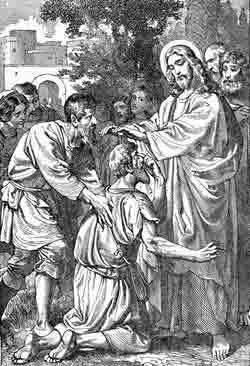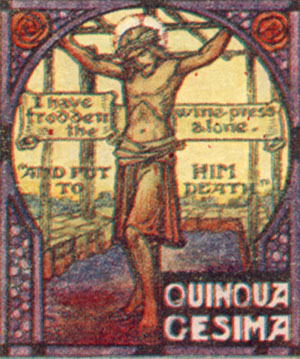Baptism commits everyone to carry a cross, especially the cross of consistent, unobtrusive charity. As Jesus commanded the blind man of Jericho to be brought to Him, so He commands His members to bring to Him those who need Him as their light and their love. We fulfill our baptismal promises by helping others to renounce Satan and to put on Christ.
 GOSPEL (Luke XVIII. 31-43.) At that time, Jesus took the Twelve aside and said to them, "Behold, we are going up to Jerusalem and everything written by the prophets about the Son of Man will be fulfilled. He will be handed over to the Gentiles and he will be mocked and insulted and spat upon; and after they have scourged him they will kill him, but on the third day he will rise." But they understood nothing of this; the word remained hidden from them and they failed to comprehend what he said. Now as he approached Jericho a blind man was sitting by the roadside begging, and hearing a crowd going by, he inquired what was happening. They told him, "Jesus of Nazareth is passing by." He shouted, "Jesus, Son of David, have pity on me!" The people walking in front rebuked him, telling him to be silent, but he kept calling out all the more, "Son of David, have pity on me!" Then Jesus stopped and ordered that he be brought to him; and when he came near, Jesus asked him, "What do you want me to do for you?" He replied, "Lord, please let me see." Jesus told him, "Have sight; your faith has saved you." He immediately received his sight and followed him, giving glory to God. When they saw this, all the people gave praise to God.
GOSPEL (Luke XVIII. 31-43.) At that time, Jesus took the Twelve aside and said to them, "Behold, we are going up to Jerusalem and everything written by the prophets about the Son of Man will be fulfilled. He will be handed over to the Gentiles and he will be mocked and insulted and spat upon; and after they have scourged him they will kill him, but on the third day he will rise." But they understood nothing of this; the word remained hidden from them and they failed to comprehend what he said. Now as he approached Jericho a blind man was sitting by the roadside begging, and hearing a crowd going by, he inquired what was happening. They told him, "Jesus of Nazareth is passing by." He shouted, "Jesus, Son of David, have pity on me!" The people walking in front rebuked him, telling him to be silent, but he kept calling out all the more, "Son of David, have pity on me!" Then Jesus stopped and ordered that he be brought to him; and when he came near, Jesus asked him, "What do you want me to do for you?" He replied, "Lord, please let me see." Jesus told him, "Have sight; your faith has saved you." He immediately received his sight and followed him, giving glory to God. When they saw this, all the people gave praise to God.Why did Christ so often foretell His passion to His disciples?
Because He wanted to show how great was His desire to suffer for us, for we speak often of that which we crave; and because He wished His disciples when they should see Him treated as a criminal and martyred, not to think evil of Him, or imagine themselves deceived, but remember that He had foretold all minutely that all happened of His own will.
Did not the disciples understand anything of what He predicted in regard to His future sufferings?
They may, certainly, have well understood He was to suffer, for which reason Peter tried to dissuade Him from it; (Matt. XVI. 22.) but they did not comprehend why or for what He would suffer, or how He would rise again. All this the Holy Ghost gave them to understand, after it had come to pass. (John XIV. 26.) The light of the Holy Ghost is of so much value, that without it even the clearest doctrines of faith are not understood.
Why does Christ so often call Himself the Son of Man?
He wished to show, in the Jewish way of speaking, He was also man, a descendant of Adam, and that we should be humble, and not seek or desire high titles.
Why did the blind man call Christ the Son of David?
Because, like all the Jews, he believed that the Messiah, according to humanity, would be of the house of David, as was promised. (Ps. CXXXI. 11.)
Why did Christ ask the blind man: What wilt thou that I do to thee?
This He asked, not because He was unaware of the blind man's wish, but to enable him the better to prove his faith and hope that through Christ he would receive his sight; and to teach us how willing He is to help us, and how it pleases Him if we confidingly place our wants before Him. We should learn from this blind man, who would not be restrained by the passing crowd in his ardent and reiterated request, not to pay attention, in the work we have commenced, to human respect, or human judgment, but to persevere, and not allow ourselves to be led astray by the world's mockery or contempt. We should also learn to be grateful to God, and faithfully cling to Him, if He has once opened the eyes of our mind, and healed our spiritual blindness, which is far more deplorable than physical blindness, for nothing can be more miserable than not to see and understand God, not to know what is necessary for our salvation, and what is pernicious.
Why is this gospel read on this Sunday?
The Church wishes to remind us of the painful passion and death of Jesus, and to move us by the contemplation of those mysteries to avoid and despise the wicked, heathenish amusements of carnival, sinful pleasures which she has always condemned, because they come from dark paganism, and, to avert the people from them, commands that during the three days of carnival the Blessed Sacrament shall be exposed for public adoration, sermons given, and the faithful exhorted to have recourse at this time to the Sacraments of Penance and the Blessed Sacrament of the Altar, with the reception of which Pope Clement XIII. (Breve, 23. June 1765) connected a plenary indulgence. A true Catholic will conform to the desire of his holy Church, considering the words which St. Augustine spoke, at this time, to the faithful, "The heathens (as also the wordly people of our days) shout songs of love and merriment, but you should delight in the preaching of the word of God; they rush to the dramatic plays, but you should hasten to Church; they are intoxicated, but you should fast and be sober."
PRAYER O most benign Jesus, who so desired to suffer for us, grant, that we may willingly suffer for love of You; that we may hate and flee from the detestable pleasures of the world and the flesh, and practice penance and mortification, that by so doing we may merit to be released from our spiritual blindness to love You more and more ardently, and finally possess You forever. Amen.
